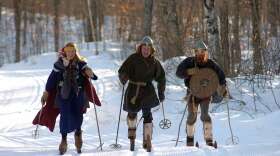Forensic science has long been the basis for popular prime time television. From Jack Klugman’s classic Quincy character in the 1970s and '80s to the various versions of CSI, forensic science has peaked our cultural curiosity for decades.
"The shows, they do their research, they have some background information... on what forensic science is capable of. They start from there, and then they kind of leap off."
It turns out that reality is equally as interesting. Diana Johnson knows this firsthand. She has seen the work in real life, as a forensic scientist with the New Jersey State Police. Now, she teaches the next generation of forensic scientists at Marian University in Fond du Lac.
Johnson says things have changed since her time in the field. "We're seeing an introduction of different markers and different collection techniques in DNA, and also just growing interest in the field. It just keeps becoming more fascinating to people, I think," she says.
That growing interest is a bit of a double-edged sword. While more people have joined the field, many have unrealistic expectations about the capabilities of forensic science, in part due to how it's portrayed on television.
"It's not just juries, it's lawyers, it's judges. They have an expectation that forensic science can just magically come up with the answers, and unfortunately, it can't."
"The techniques that they use, they're based in real science. The shows, they do their research, they have some background information on what is capable, on what forensic science is capable of," says Johnson. "They start from there, and then they kind of leap off, and... they show unrealistic methods and techniques."
Not everyone agrees that this misperception exists, and Johnson says she didn't experience any issues with the police department she worked with in New Jersey. But she still contends the idea that cases can be "magically" solved using forensic science is a pervasive problem.
"Some people say it doesn't exist, but I think it's real. I think that it's not just juries, it's lawyers, it's judges," she says. "They have an expectation that forensic science can just magically come up with the answers, and unfortunately, it can't."
Diana Johnson is the guest speaker for this month's Science on Tap lecture at the Milwaukee Public Museum, Thursday, November 10. Johnson will discuss how forensic science has been used in some of Wisconsin's most notorious cases.






